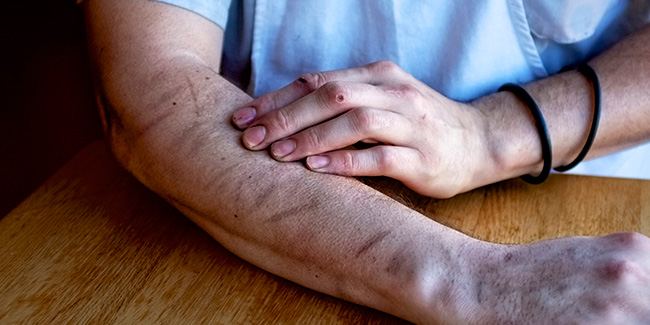
Hot oil, open flames, boiling water, red-hot metal, knives, blades, hammers, rollers, presses. A modern-day kitchen isn’t stocked much differently than a run-of-the-mill medieval torture chamber. Yet chefs use these tools daily to serve up pleasure, nourishment, even beauty. In the process of this intimate transaction (after all, when we eat out, we’re trusting a stranger to put something in our mouths), they absorb a lot of pain along the way.
Visit any restaurant in Minneapolis or St. Paul with an open kitchen, and observe the cooks at work on the line. The story of kitchen labor is written on the arms and hands of chefs in a gruesome calligraphy of scars, burns, scabs, and cuts. These are the external symbols of a job in which the slow violence of time is more insidious than the exclamation marks of traumatic-yet-temporary injury. Each jagged gash is a glimpse into a less visible reality where the unglamorous years of working on the line manifest themselves into fused vertebrae, ruined joints, and plantar fasciitis.
The next time you get ready to Instagram that beautiful dish of seared scallops, take a moment to think of the seared fingers that made it happen.
Adam Vickerman, chef, Cafe Levain
HEAVY TABLE: How long have you been working in kitchens?
ADAM VICKERMAN: Since I was 19, so about 9 years. I’m 28 now.
HT: Did you have any idea of the toll this job would take on your body?
VICKERMAN: Yeah, I kind of knew going into it a little bit … I knew since middle school that I wanted to be a cook, so I knew the path from reading a lot about it. All the glamour, or lack thereof. I still don’t really treat it seriously — you never think it’s going to happen to me — “Oh, my wrists are fine, my arms are fine …” then once you hit 30, it’s like oh, whoops!
HT: Are the long-term problems worse than the freak accidents and injuries?
VICKERMAN: If you can avoid the freak accidents, that’s best … but yeah, long term you can have some serious issues. I know for a fact that I’ll have serious carpal tunnel issues eventually. We’re using saute pans that are 10-15 pounds, flicking our wrists … I’m experiencing back issues because of that now, which is insane. You have the scars, of course …
HT: Yeah, you’ve got some good ones …
VICKERMAN:This is my oldest one [points at a large circular scar on forearm], and it’s not quite self-inflicted. When I was 19, I was trying to gain acceptance at Restaurant Levain when Stephen Brown was running the place … it wasn’t so much an initiation, but it was a hot spoon held over a flame… another cook did it and pressed it there.
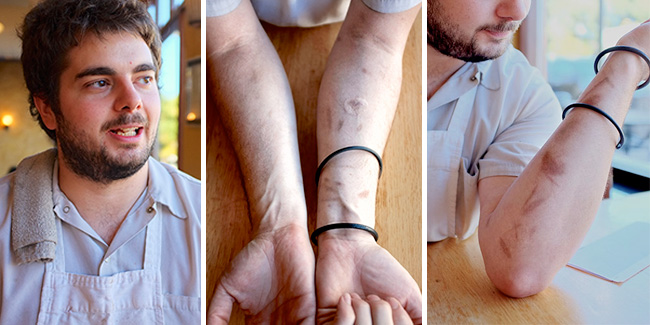
HT: Wait a second. Back this up. This is crazy.
VICKERMAN: Yeah, I felt it was like a rite of passage, like a gaining of acceptance among my peers … it was crazy … the hot spoon was held on there so long that the skin, the fat, was rendered crispy like a chicken breast or a duck breast.
HT: Jesus Christ. That is gnarly.
VICKERMAN: Yeah. Imagine that. It’s amazing because it’s 9 years old and still the most prominent one.
HT: How do you feel about that? Do you look at it with pride?
VICKERMAN: Oh yeah! Definitely! It’s stupid pride, but it’s pride nonetheless. Looking back, it’s the stupidest thing. This other one here was the same night. It was a cigarette. Same guy, same day, same deal. It was a group, hanging out at the bar after work, I’m the 19-year-old suburban kid, these guys are like, you know, uh … not heroes, but I really looked up to all these people, I’d read about these people, and it’s the sous chef, the chef de cuisine, and the executive chef at this table with me and it’s like … the young naive kid wanting to be accepted amongst these guys that I wanted to be like. I think it definitely resonated with them, too, like, “This kid’s for real, he’s no wimp.”
Sarah Master, Executive Chef, Barbette
HEAVY TABLE: Do you have any awesome scars?
MASTER: Not too bad, actually… I am very careful while I’m cooking because I’ve seen how bad it can get… I think more of the stuff I’ve had problems with in kitchens is like, my knees, my back, my feet hurt all the time… what else [laughs]? I’ve had a couple of bad burns, nothing super bad, but bad enough where I don’t want to do it again. I’m lucky too… when I do burn myself, it heals really quickly.
HT: So you’ve got superhuman regenerative capabilities.
MASTER: I guess so!
HT: How many years have you been working in kitchens?
MASTER: I’ve been cooking for about 12-13 years. I learned how to cook in New Orleans, so most of my worst battle wounds were down there.
HT: What’s been your worst single injury?
MASTER: I cut myself really badly one time, that required stitches. I was cleaning whole beef tenderloins, and I had a stack of probably five or six of them on my cutting board, and my knife was behind them. I reached over the tenderloins to grab hold of them, and grabbed my knife instead and sliced my finger open, which required a number of stitches [laughs].
HT: Did you go to the ER right away?
MASTER: Not right away… I bandaged it up, put a glove on… that filled with blood, so I changed it again, and that filled with blood.. so I thought, maybe I’ve got a problem here. It was actually here [at Barbette]. So I went downstairs, and stood with a towel on my hand, hand up in the air, and it bled and bled. So I decided it was time to go to the ER. I called my husband, and was like yeah, I’m not really feeling that good, I’ve lost a lot of blood.
HT: So is it typical that cooks just work through injuries, and don’t get things taken care of right away?
MASTER: Oh totally. I remember there was one time I was cooking in New Orleans, with a pot of oil. We didn’t have a fryer. And we had a dish on my station that was like, a rabbit two ways. I had a seared tenderloin and a fried leg that went with it. So I had to deep fry this leg, actually in a pot of oil, and regulate that all night. I had a little station set up just for changing the oil. So I was changing it out, and two little drips of oil dripped out of the pan and down my hand — I don’t have the scars anymore, but it was bad. It dripped down my hand, which puffed up huge. I screamed and cursed, and my chef told me to get off the line and I was like “No, I’m fine!” It’s a Saturday night, you know, I’m busy, I had a full rail of tickets, and she wanted to kick me off the line, and I wouldn’t go. She called my obstinate, she called me all kinds of names… [laughs]
HT: That’s interesting… it’s consistent with everyone else. No one seems to walk off. Does this kind of attitude break on gender lines at all?
MASTER: No. We have a mentality to just get it done. That’s just how it is. It doesn’t make any difference if you’re male or female; that’s just the way we’re taught. And the good people, that’s just what they do. If something needs to be done, you just do it. And that includes working through some pretty nasty shit! I’ve burned my face… I was training in a stage one day, and he had sauce on his station that broke… I was down whisking the sauce again, and he went to throw a piece of fish in the pan. it popped at him, and the oil splattered all over my face. It was on my neck, like every little sensitive spot you could possibly think of. Underneath my nose, all around my eyes, my nose, my lips. So I finished whisking his sauce, came up, came around the line, and I was like “Chef, I’m gonna go upstairs and wash my face off,” and from the look on his face, I knew it was bad… so um, it was the only time I’ve ever cried at work [laughs]. I went upstairs to the employee bathroom, washed up, and and looked a myself and I was like “Why the fuck do I do this??” I stood there, had a couple of tears roll down my face, and went back downstairs and got right back to work [laughs].
HT: How do you square up the intimacy of feeding people with the everyday pain and suffering behind the scenes to make that moment happen?
MASTER: I just think that having someone enjoy the food — enjoy something that you’ve created and spent time and had a thought process about — makes the entire process worth it. While it’s happening, you’re like “shit, this sucks, I can’t believe I just burned or cut myself or whatever…” but it makes it all worth it when somebody eats the food. The long hours, everything. It’s all worth it when someone tastes your food.
HT: So your passions and ideas are riding this wave of constant injury.
MASTER: Exactly!
HT: Do you think that the general dining public has any idea of what it takes to get their dinner on the table?
MASTER: I don’t think so. I think they have some idea, and the prevalence of all these cooking shows now, you get a chance to see what it’s like a little bit in the kitchen. But as far as prep goes, and every tiny detail that goes into making a dish of food, I don’t think they have any idea of what goes into it. Everybody says “oh, chefs work long hours,” but I don’t think they understand how much, really, that is, or how many hours of work goes into your single plate of food. But that’s kind of the joy of dining out, you don’t have to think about it. Someone does that for you, and you just get to enjoy the fruits of someone else’s labor! I don’t mind if people don’t know. I know. I know what I had to go through to get a plate of food on a table, to get somebody to enjoy it. That’s enough for me.
Lenny Russo recently wrote a piece in the Star Tribune describing the long-term physical effects of a career working in the kitchen. We caught up with him as he suited up for a busy weeknight dinner prep. On our way out, we ran into another Heartland chef — Market Manager Dan Stepaniak.
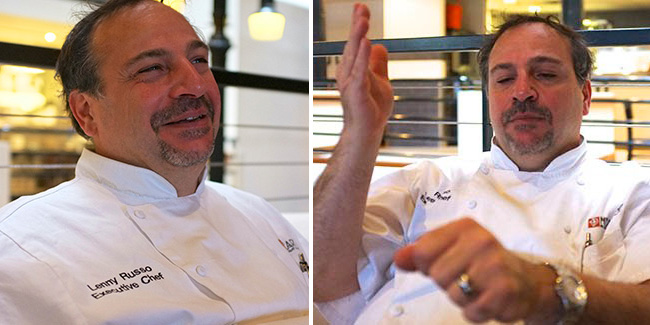
HEAVY TABLE: What’s been the single worst kitchen injury in your career?
LENNY RUSSO: I’ve burned myself badly a few times. Once with rendered duck fat, which is a bad thing … another time, as a dishwasher, with boiling water. It wasn’t so much the burn as the location, which was on my stomach, which is really sensitive. I plunged an oyster knife into my hand once while shucking, and the knife went into my hand here [points at palm] … there was a guy across the table from me, and the blood shot across the table and hit him in the chest. I actually got a little shaky on that one. That was around 1978. That one required some stitches. I’ve stitched myself.
HT: Wait, you’ve stitched your own wounds?
RUSSO: Yeah, if they don’t close up … I cut one of these fingers right on the knuckle, and it just wouldn’t close, so I sewed it with a needle and thread. And that did the trick. I put a cleaver in my hand a couple of times … at our old location, we had a buyout one night, and the party was running late. I don’t like to stand around and waste time, so I went to work on a whole veal calf. I decided I was gonna cut shoulder chops, and so I had taken the coppa out of the shoulder with the bone still attached … I got the first chop off, and went for the second. When I swung the cleaver, the shoulder tilted, and I chopped right into my finger. I couldn’t really do anything but wrap it up, because this huge party was on their way, so … it eventually healed. But I did it again maybe a year later. Same finger. Apparently I didn’t learn my lesson the first time.
HT: Did you work through it?
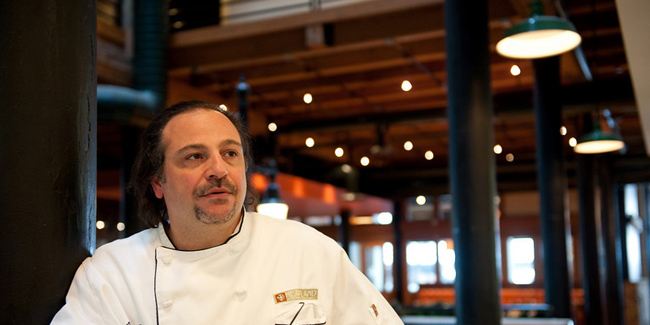
RUSSO: Oh yeah, I kept working.
HT: So it seems that when you guys get hurt, no one ever takes time off.
RUSSO: Oh, no. Nobody takes time off. Even when I did this one [points to cleaver scar on hand], which was really bad, I kept working with one hand while this was taped up to my chest, elevated.
HT: So this is something you touched on in your Star Trib article … do you feel that diners aren’t very aware of the risks involved in cooking?
RUSSO: I think they’re aware of the stuff we’ve been talking about — traumatic events, injuries.
HT: But they don’t necessarily know about the long-term stuff.
RUSSO: Right. That stuff’s way worse. Everything I just talked about? All that stuff’s healed. The worst is the wear and tear on your joints and muscles. It’s those kind of things that take a toll … things that turn chronic, and the older you get, the worse they get. I think the most serious thing is that we’re tasting food all day, and there’s no conscious thought when you’re tasting about how well balanced what I’ve eaten is today. When something comes out, I have to taste it. I can’t not taste it. Sauces, etc. All day long. So we’re probably consuming twice as many calories as a normal human being should — it’s a constant battle of the waistline, the blood sugar, the cholesterol. So it’s important that as you get older to start working out — the problem for some of us, for me … I didn’t want to acknowledge that I was getting old. Because this is a young person’s game. And so, I was ignoring the changes in my body that made it necessary for me to get more exercise.
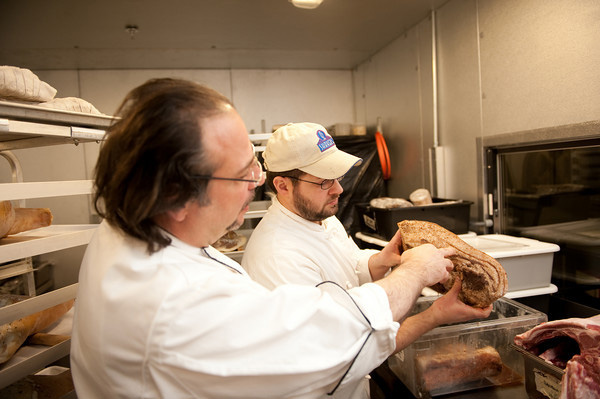
HT: So it seems safe to say that early in your career, you had no idea of the damage this kind of work does to your body.
RUSSO: No. And back then, that was kind of a badge of honor. And it might still be a badge of honor today. I think that the younger chefs are looking at people who are mentoring them and they’re seeing that physical toll, and they’re beginning to realize that they have to do this now.
HT: Is there a hard-headedness among chefs?
RUSSO: We never go to the doctor. Even if we have insurance, we just don’t go. I think we all want to know we’re invincible. And that we’re gonna be able to do this forever. I mean, I’ve got friends my age or older (55) who are still working the line, particularly in New York. I stopped doing it when we got back here at the new location. My legs just couldn’t take it anymore.
HT: So it sounds like there’s a kind of one-upmanship among chefs.
RUSSO: It’s not so much that as wanting to keep up and not wanting anyone to think you’re a pussy. When I say that, you know, some people are offended by that word, but women chefs have the same attitude. They don’t wanna be seen as wimpy, or be called a pussy because they can’t work the line anymore. Quite frankly, my generation of chefs — we’re talking Lucia Watson and Brenda Langton — I think outside of the three of us, there aren’t many doing it at our age. And we’re more like entrepreneurs now than actual chefs.
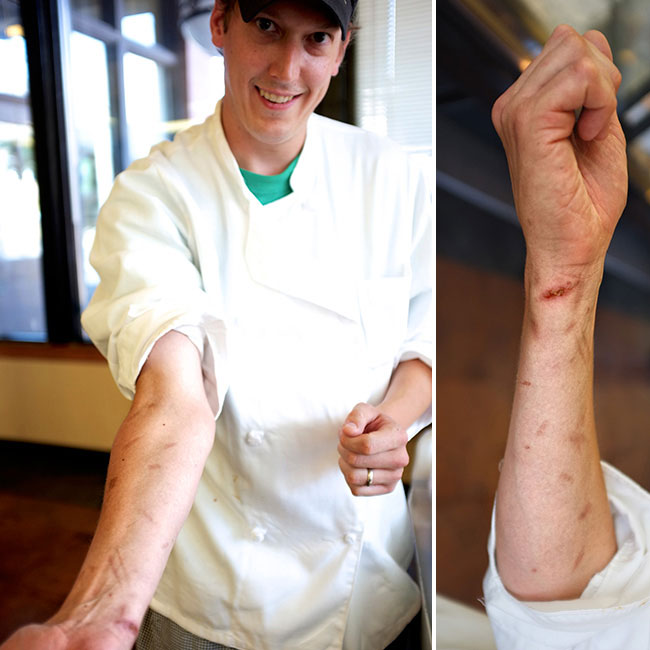
Dan Stepaniak, market manager, Heartland Market
We caught up with Stepaniak as he stocked up jars of freshly packed pickles in the market.
DAN STEPANIAK: I had one hospital trip for a burn, when I was at Nick & Eddie about four years ago. I was going to put a pan in the oven, and the chef had some vegetables that were roasting in there … so when I opened the door, a huge burst of steam came out and completely covered my hand … instantly turned the entire back of my hand into a giant blister [chuckles]. I worked with Adam Vickerman at Cafe Levain, and he’s just the champ of scars … you should interview him! [Ed. note — done!]
Jamie Malone, Chef de Cuisine, Sea Change
HEAVY TABLE: Have you had any severe kitchen injuries in your time?
JAMIE MALONE: Yeah, I’ve had a few… I think my most serious one – they’re actually all kind of embarrassing – was when I was paddling sausage, and my hand got crushed in the paddle attachment to the giant Hobart. It just rolled over and smushed my entire hand. That’s the only time I’ve ever had to go to the doctor for a kitchen injury. I stuck a knife all the way through my hand once, here [points to webbing between thumb and first finger], and it missed everything, so it was just like boop! right through. So it was kind of scary, it was an open wound for awhile. At first I was like “Oh shit, something bad’s gonna happen…” but then it turned out to be fine.
On my arms I have kind of the standard spots from oven racks and stuff; I’m not too bad, though. I think we always like to think that as we mature in the kitchen and as a line cook, you won’t burn yourself as much, and get a little more graceful.
HT: How long have you been working in kitchens?
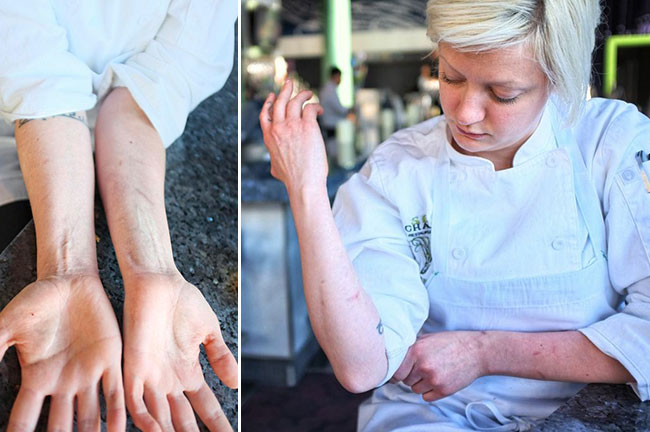
MALONE: 9 years. I started at La Belle Vie. It was the best crew: Matt Bickford, YC, Bill Fairbanks, Jim Christiansen, Shawn Smalley… an all-star crew.
HT: It seems like the old school attitude in the kitchen is to work through injuries, pain, and being sick… has that been your experience? Is that changing, or are those attitudes becoming less tolerable?
MALONE: I think cooks are becoming more professional. They have expectations coming into a job about how they’re going to be treated. And you know, there’s a shortage of cooks. I think that the dynamic right now is that we have to work hard to be a good workplace for cooks, where before it was like “you’re lucky to be here.” They want to come here to learn, and they also want the normal things anyone in another job might expect, like time off, and to be taken care of as far as uniforms, their environment, everything. So yeah, I’ve seen it change even in the short time that I’ve been cooking.
MALONE: Oh for sure… cooks get paid more. That kind of culture where a chef just screams at you till you do what you’re supposed to do doesn’t fly anymore. I don’t know if any kitchens really function like that anymore. It seems like the new cooks that I see, they haven’t been exposed to that.
HT: Seems like that in the past, there’s been more of a prideful culture: no one wants to be seen as a wimp, or take time off. Is that any different from your perspective as a female in the kitchen? Is that attitude prevalent regardless of gender?
MALONE: It comes out of the necessity of getting the job done. It’s a lot of pressure. The number one rule in our kitchen, and it’s not an aggressive kitchen, is to get it done. There’s lots to do in a short amount of time, people don’t realize how hard it is. Like physically, mentally… to be a line cook, you’ve gotta come to work and be on.
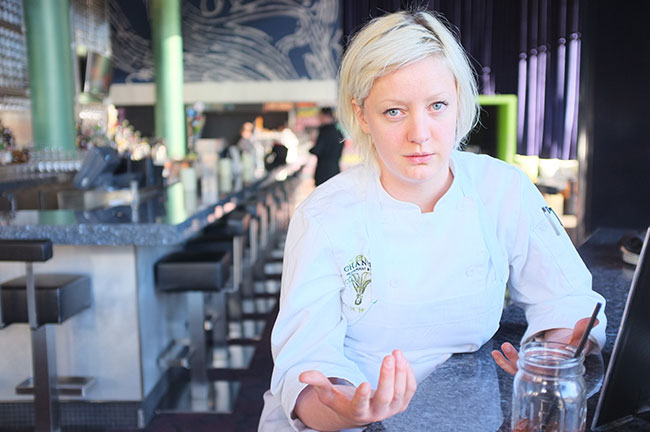
HT: In talking to chefs, we’re getting the impression that the general dining public might notice the superficial scars and everyday injuries, but that they might not have a good sense of the deeper implications of many years in that intense environment. What do you think?
MALONE: Yeah, it’s crazy — I just started noticing the long-term stuff now, at 31. And I try to take really good care of myself. I do yoga everyday. But everything hurts. My wrists hurt, my hips hurt, my legs hurt. You do a six day work week, 12-14 hours every day, and you just feel like shit! You wake up and your brain’s fried, your body’s fried, you know? And it’s week after week after week, you don’t really get a break.
HT: The idea of feeding someone is pretty intimate. After all this pain and suffering, you’re creating something that is supposed to make someone happy.
MALONE: It’s so true. I think about that. I often will think about that and wonder: What personality does it take to do this for a living? Why are we all doing this? I think ultimately, it’s our contribution… maybe it’s pretty well know that cooks tend to be more on the introverted side of things. So maybe it’s a way of expressing care for others in a way that we don’t know how to do otherwise.
HT: And enduring all the physical challenges is worthwhile, at the end of the day?
MALONE: It is. Because I can’t think of any other job that could make a person, you know, happier, or to be more satisfying at the end of the day. It’s really satisfying. But I think by the time you figure out how much you’ve destroyed your body, it’s too late, and what else are you gonna do? [laughs].
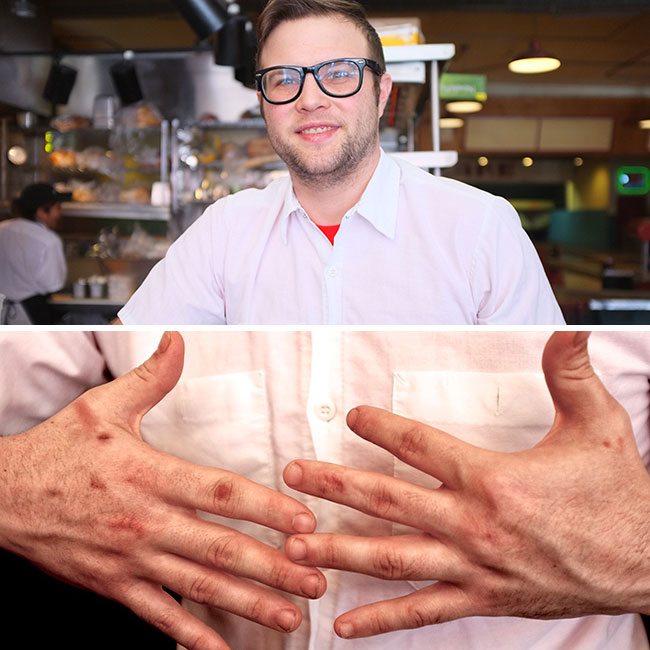
Jordan Shiveley, sous chef, Bryant Lake Bowl
HEAVY TABLE: How long have you been cooking?
JORDAN SHIVELEY: I’ve been cooking professionally for about 14 years. Did the traveling thing, catering movie sets … seen a lot of the country before I moved to Minneapolis.
HT: In your time, have you noticed any long-term toll, physically?
SHIVELEY: Oh yeah. Mostly on my neck and back. I went to the chiropractor for the first time the other day, and she said most people’s spines are supposed to look like this [draws a normal spine shape in the air], but that mine goes directly out at an angle. It’s like at a straight fucking angle [laughs] … and I have chronic back pain, neck pain, spasms.
HT: How do you manage that? Do you take time off?
SHIVELEY: Oh, no. You just take ibuprofen and keep going.
HT: Have you seen chefs burn out?
SHIVELEY: Oh, yeah. You see older chefs and prep cooks who are all creaky, and can’t even cut right, slowing down the line …
HT: Is it a pride thing?
SHIVELEY:Totally. It’s the whole macho / masochist “stay on the line” thing, where’s it’s just like … scars are a badge of honor, 18-hour days show that you’re a good cook, not going to the doctor when you cut yourself is like the way it’s supposed to be.
HT: You think that culture is ever going to change in the kitchen?
SHIVELEY: It’s changing a little bit … some of the guys we’ve hired here are pretty young, and one of them burned himself pretty bad, and he took four days off. And we were like… you wanna take four days off for a burn [laughs]?
HT: So is that scenario more acceptable than it might have been 10 years ago?
SHIVELEY: Oh, yeah. If I had ever tried to do that, they would’ve said no … but now, it’s like, that’s your right, you can do that if you want. I mean, inside, we’re all annoyed, but we don’t make people work when they’re hurt anymore. You can’t scream at people as much. When I was becoming a chef, the chef was always in your face, like, “You’ll never fucking make it!” you know?
HT: What’s been your worst single injury?
SHIVELEY: This one was pretty bad … it wasn’t with a knife or anything, I was working on a movie set, going in and out of these metal-sided trailers with chafing dishes. Someone bumped into me and the door frame of this trailer cut a huge flap off my finger, straight to the bone.
HT: Did you go to the hospital?
SHIVELEY: No, I put plastic wrap and duct tape around it, worked 12 hours, and then went to the camp medic to get it looked at.
HT: How often do you think plastic wrap is used as an emergency bandage?
SHIVELEY: All the time. A lot of time we use super glue, then wrap it in plastic wrap, a glove, and that’s it. When I was really young, one of my first cooking jobs, I was actually on the line … I was cubing butter for roux, and I put the knife right through my hand here [points to palm], it was covered in butter, and it just went straight through. It didn’t even leave a scar! At the time, I could see the fat layers and everything [laughs]. I’ve cut the tips off a few fingers a couple times.
HT: When you started this career, did you have any idea of what the long-term physical toll might be?
SHIVELEY: Nope. I thought it was just cooking. I started cooking when I started going after my Master’s degree [in Theology], and it just went from there. If you’re burning your hand holding a pot, you don’t drop it … you just keep going till you can set it down! You’re not gonna redo five hours of cooking, you know? I got boiling butter poured into my boots one time. I was out in the desert, wearing these hiking boots instead of clogs, and someone else poured boiling butter down into my boot [laughs].
HT: Now that you’re a veteran, how long do you think you can be on the line?
SHIVELEY: I’d say till I’m 40. I’m 32 now. Then I’ll find something else to do … maybe writing, maybe open a taco stand, who knows?

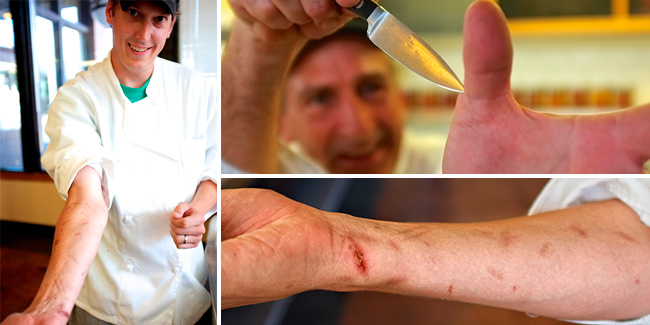
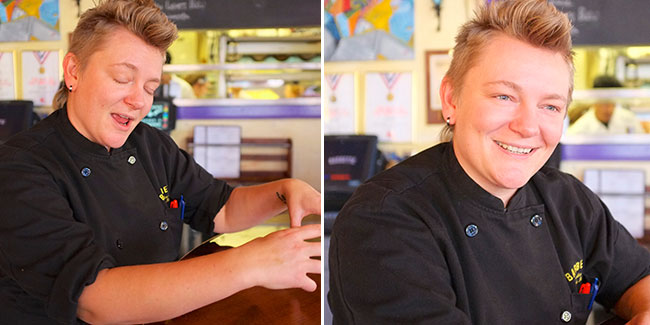
Those aren’t scars. I call them my resume!
Yeah the other night my knuckle met the flat top